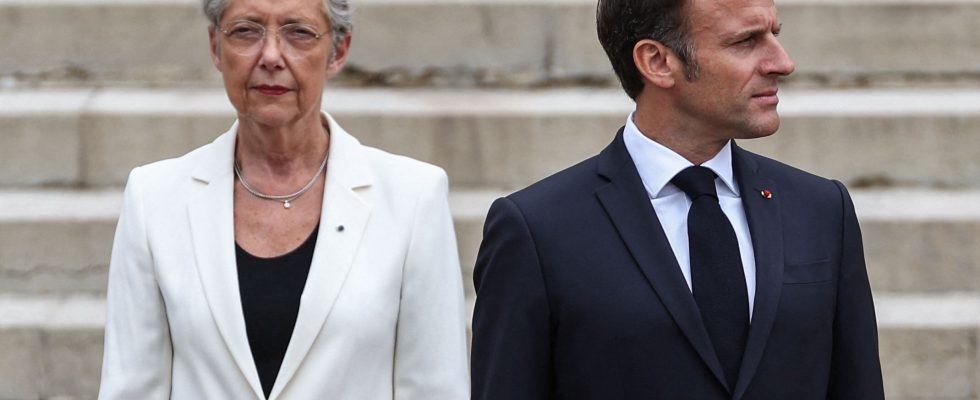But, in fact, which side will the coin land on, once the immigration law is promulgated? Today, the right is pleased to have obtained a text to control migratory flows while the left protests against a law contrary to the values of the Republic. The executive no longer knows very well which way it leans. Wednesday morning, on France Inter, Elisabeth Borne argued that “the text respects (has its) values” while conceding that it would undoubtedly be necessary to “return” to certain measures. Wednesday evening, on France 5 this time, the President of the Republic relied on the Constitutional Council to rid him of a few bags of knots. “I think that there are provisions which are not in conformity with the constitution,” noted Emmanuel Macron, while denying that they are “of a National Rally nature” and assuming to fight against irregular immigration. By dint of about-faces, measures adopted to please some, unraveled the next day to please others, the executive ended up finding itself on Tuesday evening, during the solemn vote in Parliament, with a number of measures wanted by the more offensive of the Republicans which he did not accept. To convince its own majority to pass the law, the government claimed that these provisions would never be implemented. Because unconstitutional for almost a third of them. Because they are subject to decree for their practical application. At the risk of further confusing the reading of the text.
It is true that several measures voted on at the start of the week face a very high risk of rejection by the wise people of rue Montpensier for unconstitutionality. Enough to satisfy the “left” of the majority, less the Republicans. First of these, the setting of quotas over three years by Parliament. Firstly because in the name of the separation of powers, Parliament cannot impose policies and injunctions on the executive. A similar provision provided for in a 2003 immigration law defended by Nicolas Sarkozy was censored for this reason. The government cannot ignore this. Just as he knows that quotas can only apply to two types of residence permits: those issued to students or workers. For the rest, the law prohibits it. It is impossible, in fact, to define the number of entries for family reunification or sick foreigners. This would mean encroaching on fundamental rights, such as the right to live as a family. What would happen, for example, if someone requested family reunification when the quota had just been reached? By excluding only asylum which, by nature, is not quantifiable and depends on arrivals and international situations, the law is most certainly off the mark.
Equal rights in question
Several other provisions could be amended. And these are the ones that have sparked the most debate in recent days. Indeed, setting a different deadline for obtaining personalized housing assistance (3 months for foreigners who work, 5 years for those who do not work) could constitute a breach of equality between people. Requiring foreign students to provide a “return deposit” is, for the same reason, a high legal risk, without even mentioning the social consequences or those raised by the leaders of higher education of lesser academic attractiveness in France. Finally, measures aimed at limiting family reunification could also be skipped when they pass through the Constitutional Council. It is, in fact, possible to impose conditions but they must be proportionate and not prevent the exercise of a right considered fundamental. Is requiring someone to master the French language before arriving in the country acceptable?
Constitutionality is not the only doubt hanging over this text: to satisfy the right, the government accepted measures whose uselessness, even “counter-productivity”, it knows perfectly well. With a desire: to display your determination, even if the effects are very different from the promises. Among them, the reintroduction of the offense of illegal residence. It was abolished in 2012 when the Court of Justice of the European Union and the Court of Cassation imposed that there would no longer be a prison sentence for the sole reason of lack of documentation. Today, the law reintroduces the offense, with the possibility of a fine and placement in police custody. Objective ? Facilitate expulsions by detaining foreigners. But while detention centers are struggling to meet needs, there is a great risk of overcrowding police stations or gendarmes with almost no results apart from the repressive aspect against illegal immigrants.
Another untimely declaration, to reassure his left wing, this time. In the last minutes before the solemn vote on Tuesday, Gérald Darmanin promised to “double” the number of regularizations in professions in tension compared to the current practice with the Valls circular. That is between 7,000 and 10,000 additional titles each year. Until then, in the discussion, the Ministry of the Interior had always refused to give figures based on reliable statistics for fear of exposing itself to the accusation of “massive regularization”. That he allows himself to do so in the final straight testifies more to his excitement than to his reliability. Of course, the prefects being the sole decision-makers, the government will always be able to regulate the number of titles granted via regularization criteria. But precisely for this reason, he or someone else who succeeds him in power will be able to vary it without difficulty, or even reduce it to almost nothing. But at the time of the save-who-can Tuesday evening, the substance of the text and the scope of the measures no longer mattered. All that counted was obtaining a majority. It will be good time, tomorrow, later, in January…
